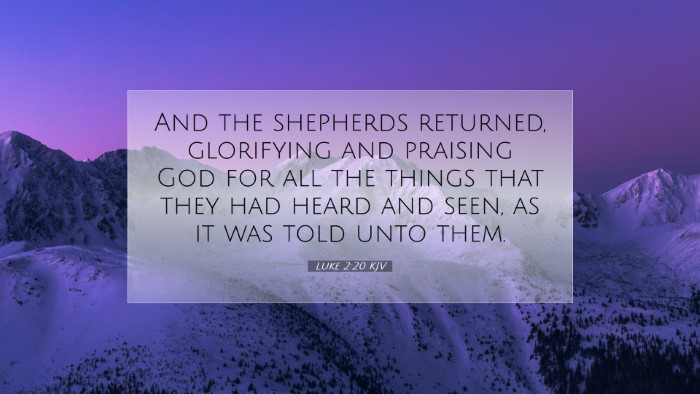Commentary on Luke 2:20
“And the shepherds returned, glorifying and praising God for all the things that they had heard and seen, as it was told unto them.”
Introduction
This verse presents a profound moment following the birth of Christ, depicting the shepherds’ response to the angelic message and the sight of the newborn Savior. Their return, full of praise and glorification, encapsulates the essence of the Christian response to the gospel—joyful worship arising from divine revelation.
Contextual Background
The context of this verse is crucial for understanding its message. Prior to this, the shepherds received the announcement of the birth of Jesus from the angels, and they hasten to Bethlehem to witness the miracle. This act of humble shepherds being favored with such a revelation speaks volumes of God's grace, highlighting that the message of salvation is available to all, regardless of social status.
Verse Analysis
In examining Luke 2:20, we find key themes that resonate deeply within Christian theology:
- Glorifying God: The shepherds' act of glorifying God signifies their recognition of God’s glory displayed in the birth of Christ. Matthew Henry notes that their glorification was not merely verbal but stemmed from a profound internal transformation prompted by their encounter with the Divine.
- Praising God: Praise in biblical terms often encompasses adoration, thanksgiving, and exultation. Albert Barnes emphasizes that their praise was a response to the fulfillment of God's promises, as they acknowledged the significance of what they had witnessed.
- Faithful Witness: The shepherds’ testimony serves as a model for believers. Adam Clarke highlights that their return, reflecting on their experience, underscores the importance of sharing the good news with others, embodying the call to evangelism that persists in the Church today.
- Response to Revelation: This verse illustrates the natural human response to divine revelation. The shepherds’ immediate reaction of joy and worship challenges the reader to consider how they respond to the revelations of God in their lives.
Theological Implications
This passage prompts several theological reflections:
- Incarnation: The birth of Christ signifies God’s ultimate act of love and humility. The shepherds’ encounter promotes the understanding that God is approachable and that His glory is not confined to the elite or powerful.
- Faith and Worship: The shepherds exemplify that true worship is rooted in faith. Their experience of seeing Jesus and responding in glory and praise provides a blueprint for Christian worship.
- Community of Believers: The communal aspect of the shepherds’ return highlights the necessity of sharing experiences of God's grace within the body of Christ. Their collective glorification serves as a reminder of community in worship and witness.
Practical Applications
This verse presents practical applications for modern believers and church leaders:
- Encouraging Praise: Pastors should encourage their congregations to cultivate a lifestyle of praise that reflects awe and reverence for God’s works in their lives. Setting aside time for testimonies can enrich worship experiences.
- Faith and Assurance: Students of the Bible can draw assurance from the shepherds’ story that God communicates His truths clearly and that responding in faith leads to deeper understanding and relationship with Him.
- Evangelism: The shepherds serve as an inspiration for evangelism, reminding believers to share the gospel joyfully and openly, demonstrating that every encounter with God leads to a witness to others.
Conclusion
Luke 2:20 encapsulates a moment of joyful response to the incarnation of Christ. The shepherds’ glorification and praise model a heart of worship that acknowledges God’s mighty works. Their journey back, transformed by their encounter with the Divine, urges all readers—pastors, students, and theologians—to reflect on their own responses to God’s revelations and to take joy in sharing His message with the world.


